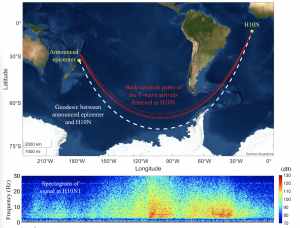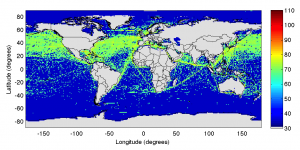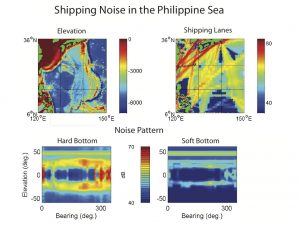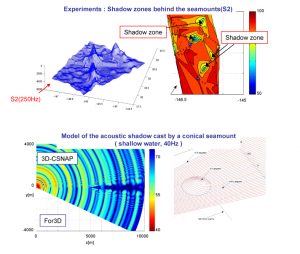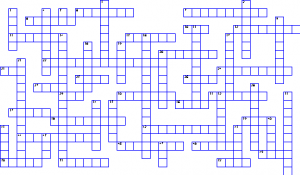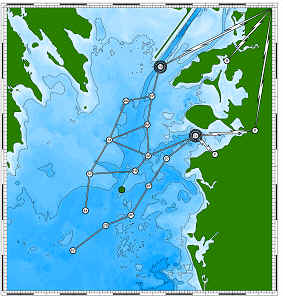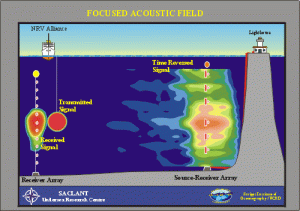webapp-support
On 18 June 2020, an Mw7.4 submarine earthquake occurred in the Kermadec Trench, northeast of New Zealand. This powerful earthquake triggered energetic tertiary waves (T-waves) that propagated through the South Pacific Ocean into the South Atlantic Ocean, where the T-waves recorded by a hydrophone station near Ascension Island 15,127 km away from the epicenter
Read MoreShipping noise is an important part of the ocean ‘environment’, and presents interesting modeling problems. The upper figure shows shipping-noise source-level densities at 200 Hz. The shipping lanes are clearly visible. The colors represent dB re: 1 microPa2 /Hz @ 1m/m2. These source level maps can then be convolved with the propagation characteristics of the ocean channel to show the resulting ‘illumination’ or ensonification of the ocean. The level is displayed as a Noise Spectral Density with a scale in dB referenced to 1 microPascal ^2/Hz. (Also available as a KMZ file.) Caution: these are preliminary (DRAFT) results presented to…
Read MoreShipping noise is an important part of the ocean ‘environment’, and presents interesting modeling problems. The Philippines Sea is chosen as an example of a moderate sized ocean basin for the calculation of noise directionality. The upper left shows the elevation with the color bar giving negative elevations in meters. Green is also used for land. Shipping noise source level densities, at 50 Hz, are plotted in the upper right and are indicative of shipping lanes. The colors represent dB re: 1 microPa2 /Hz @ 1m/m2. A virtual receiving array is located in the center of the basin. The calculated…
Read MoreONR’s BASSEX program is studying the acoustic shadows cast by seamounts. The example above shows the bathymetry, along with measured TL for a recent test near the Kermit-Roosevelt seamount in the North Pacific. The strong shadowing effects are clearly visible. Three-dimensional acoustic models (lower panels) are being validated using a benchmark problem with a conical seamount.
Read MoreClick here to download a PDF of the Ocean Acoustics crossword puzzle. (Solution Key)
Read MoreThe wireless internet extends to the sea …. ONR’s research in high-frequency acoustic propagation and acoustic communications is providing the underlying science that will enable flexible undersea networking. A prototype system shown above has been developed in the navy’s SeaWEB program. The network is being used for real-time oceanographic observations in the FRONT program.
Read MorePossible applications of are being studied by several groups. A transmitted signal is received on the vertical array on the right as a complicated waveform. However, when that received waveform is back-propagated, a focused signal is received back at the source.
Read More